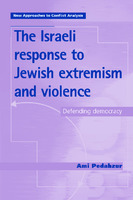The Israeli response to Jewish extremism and violence
| dc.contributor.author | Pedahzur, Ami | |
| dc.date.accessioned | 2010-06-01 00:00:00 | |
| dc.date.accessioned | 2020-04-01T15:31:24Z | |
| dc.date.available | 2020-04-01T15:31:24Z | |
| dc.date.issued | 2002 | |
| dc.identifier | 341387 | |
| dc.identifier | OCN: 994397725 | en_US |
| dc.identifier.uri | http://library.oapen.org/handle/20.500.12657/35007 | |
| dc.description.abstract | This book looks at the theoretical issue of how a democracy can defend itself from those wishing to subvert or destroy it without being required to take measures that would impinge upon the basic principles of the democratic idea, such as human rights, freedom of speech and the freedom to form political organisations. This dilemma has captured the attention of philosophers as well as legal scholars for many years, but has thus far been rarely studied employing institutional and social frameworks. In this book such frameworks are incorporated into the discussion of the 'paradox' in an attempt to provide an answer to the question: is there a golden path which can reconcile between the democratic polity's need to defend itself and, at the same time, maintain responsibility to protect and safeguard the basic right of its citizens? It takes as its case study of this issue the Israeli response to Jewish extremism and violence, which tests the theoretical framework outlined in the first chapter of the book. Providing an extensive diachronic scrutiny of the State's response to extremist political parties, violent organisations and the infrastructure of extremism and intolerance within Israeli society. It emphasises the dynamics of the response and the factors which encourage or discourage the shift from less democratic and more democratic models of response. The book is unique in that it links social and institutional perspectives to the study. The book will be vital reading for students of peace studies, conflict analysis, international relations and international politics, as well as students of the political situation in the Middle east. | |
| dc.language | English | |
| dc.subject.classification | thema EDItEUR::G Reference, Information and Interdisciplinary subjects::GT Interdisciplinary studies::GTU Peace studies and conflict resolution | en_US |
| dc.subject.other | jewish | |
| dc.subject.other | israel | |
| dc.subject.other | extremism | |
| dc.subject.other | Civil society | |
| dc.subject.other | Democracy | |
| dc.subject.other | Judaism | |
| dc.subject.other | Kach and Kahane Chai | |
| dc.subject.other | Knesset | |
| dc.subject.other | Meir Kahane | |
| dc.title | The Israeli response to Jewish extremism and violence | |
| dc.type | book | |
| oapen.identifier.doi | 10.7228/manchester/9780719063725.001.0001 | |
| oapen.relation.isPublishedBy | 6110b9b4-ba84-42ad-a0d8-f8d877957cdd | |
| oapen.relation.isbn | 9780719063725 | |
| oapen.remark.public | Relevant Wikipedia pages: Civil society - https://en.wikipedia.org/wiki/Civil_society; Democracy - https://en.wikipedia.org/wiki/Democracy; Extremism - https://en.wikipedia.org/wiki/Extremism; Israel - https://en.wikipedia.org/wiki/Israel; Israelis - https://en.wikipedia.org/wiki/Israelis; Judaism - https://en.wikipedia.org/wiki/Judaism; Kach and Kahane Chai - https://en.wikipedia.org/wiki/Kach_and_Kahane_Chai; Knesset - https://en.wikipedia.org/wiki/Knesset; Meir Kahane - https://en.wikipedia.org/wiki/Meir_Kahane | |
| oapen.identifier.ocn | 994397725 |

